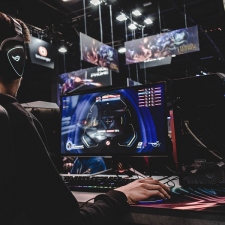eSports have been presented as being both a disruptor of and successor to, physical, ‘traditional’ sports. The pitch is that this form of digital rather than physical competition is appealing to investors as the ground floor of a whole new kind of event. Rising out of small-scale amateur tournaments the hook is certainly there to bring in those wanting to capitalise on gaming’s move to the ‘big leagues’.
Multiplayer tournaments, LAN parties and even in-person tournaments have existed for nearly as long as competitive gaming. But eSports marks the first time that the format could expand into what was previously the sole domain of major sports like football, baseball and cricket.
Comparisons to traditional sports are of courseconstant and expected. With the events of the past year however, coming into 2023 some outlets such as Bloomberg are proposing that the peak of eSports sponsorship has passed at least for now, with investors disappointed that promotions like Evo didn’t turn into the next NBA.
Evo being the premier fighting game tournament and the NBA being… Well, the National Basketball Association. This is not a specific example, but a good indicator of the kind of perspective at play here. For many investors the idea of eSports being like ‘proper’ sports was their main frame of reference. So when eSports didn’t turn out the same and some sponsors stepped back, outlets like Bloomberg have begun to declare a potential downturn. However, this may be a a misinterpretation of where eSports could go, and indeed ignoring that it is inherently different to physical sports in the first place.
Troubles ahead
While eSports won’t disappear anytime soon, it does appear to have trouble on the horizon. One of the biggest sponsors of eSports have been cryptocurrency investors. As that sector faces its ongoing ‘crypto winter’ many firms have become insolvent or otherwise faced difficulty. And that does spell possible difficulties for landing Sports promotions in the near future. As Bloomberg cites, crypto-firm FTX which faces major legal problems and is practically insolvent, was a major eSports sponsor.
Part of the difficulty with sponsorships that eSports purportedly faces could be the difference in audiences. Whereas events such as the Superbowl see massive audiences of all societal strata, eSports audiences are usually tech-savvy gamers of a relatively narrow audience type. It’s therefore unsurprising that we see firms such as BMW pulling sponsorships, as during a period of global economic uncertainty, an eSports audience is far from assured to be interested in buying a new car.
eSports is immensely accessible and thus the barrier for entry is low, and that means the audience is possibly more likely to be frugal with spending compared to the usually middle-class audience of traditional sports.
Finding its audience
However, if there’s one industry that can benefit massively from appealing to an eSports audience, it’s consumer electronics. If we need an example then look no further than the Snapdragon Pro Series. Which recently partnered with Samsung to exclusively use their Galaxy line of phones for some of their tournaments. This shows not only an understanding of an eSports audience, but also of mobile specifically. Aside from the near universal appeal (and some might say necessity) of mobile phones, selling more powerful and thus more valuable units to a gaming-inclined audience is a lot more of a sure thing than more significant investments such as cars or insurance.
This is especially notable when one takes into account the fact that mobile eSports are growing in popularity. Although casual and hyper-casual titles are virtually impossible to turn into competitive multiplayer formats, more familiar ones such as battle royale games are far more feasible.
This is why games like PUBG Mobile have topped the eSports viewing charts in the past year, and why we saw new promotions popping up over time to encourage mobile gamers into the eSports scene. With key hires such as Kim Meltzer coming from major platform promotions into the mobile.
Overall, it’s undeniable that the original point of Bloomberg’s article which sparked this reflection has merit. eSports has not proven to be the massive untapped market that major sponsors hoped for… yet. However, neither is it in danger of suddenly being buried, even with the loss of major sponsors such as FTX due to insolvency. With even countries such as Saudi Arabia citing eSports as a potential source of revenue and investment, there’s no doubt a greater peak is still to come.

